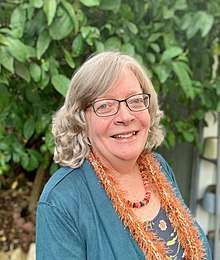Anne Villeneuve (scientist)
Anne Villeneuve is an American geneticist. She is known for her work on the mechanisms governing chromosome inheritance during sexual reproduction. Her work focuses on meiosis, the process by which a diploid organism, having two sets of chromosomes, produces gametes with only one set of chromosomes. She is a Professor of Developmental Biology and of Genetics at Stanford University and a member of the National Academy of Sciences.[1]
Professor Anne Villeneuve Ph.D. | |
|---|---|
 | |
| Education | University of Notre Dame, Massachusetts Institute of Technology |
| Scientific career | |
| Institutions | Stanford University |
| Academic advisors | Barbara J. Meyer |
| Notable students | Abby Dernburg |
Career
Villeneuve earned a B.S. in Biochemistry at the University of Notre Dame in 1981, and a Ph.D. in Biology from MIT in 1989, where she worked on sex determination and dosage compensation[2] in the laboratory of Barbara J. Meyer.[3] She joined Stanford University as an Independent Fellow in 1989 and began to work on meiosis. She joined the faculty at Stanford in 1995.
Her work has been instrumental in establishing the nematode Caenorhabditis elegans as a major model system for investigating how homologous chromosomes pair up during meiosis, and how they recombine, exchanging genetic information.[3] Her work has helped elucidate whether mechanisms of meiotic recombination are conserved from yeast to multicellular organisms.[4]
Awards and honors
- 2019: Genetics Society of America Medal[5]
- 2017: Member, National Academy of Sciences[1]
- 2016: Member, American Academy of Arts and Sciences[6]
- 2016: American Cancer Society Research Professor Award, American Cancer Society[7]
- 2003: Kirsch Investigator Award, Steven and Michele Kirsch Foundation[8]
- 1999: Junior Faculty Scholar Award, Howard Hughes Medical Institute
- 1996: Searle Scholars Award, Chicago Community Trust[9]
References
- "Three Stanford faculty elected to National Academy of Sciences". News Center. Retrieved 2019-05-11.
- Villeneuve, A. M.; Meyer, B. J. (1990). "The role of sdc-1 in the sex determination and dosage compensation decisions in Caenorhabditis elegans". Genetics. 124 (1): 91–114. ISSN 0016-6731. PMC 1203913. PMID 2307356.
- "Anne Villeneuve". www.nasonline.org. Retrieved 2019-05-11.
- Dernburg, A. F.; McDonald, K.; Moulder, G.; Barstead, R.; Dresser, M.; Villeneuve, A. M. (1998-08-07). "Meiotic recombination in C. elegans initiates by a conserved mechanism and is dispensable for homologous chromosome synapsis". Cell. 94 (3): 387–398. doi:10.1016/s0092-8674(00)81481-6. ISSN 0092-8674. PMID 9708740.
- "Genetics Society of America Awards 2019 GSA Medal to Anne Villeneuve". Genes to Genomes. 2019-05-09. Retrieved 2019-05-11.
- "Newly Elected Fellows". members.amacad.org. Retrieved 2019-05-11.
- "American Cancer Society Awards New Research and Training Grants". American Cancer Society MediaRoom. Retrieved 2019-05-11.
- "Kirsch Foundation Previous Investigators". www.kirschfoundation.org. Retrieved 2019-05-11.
- "Searle Scholars Program : Anne M. Villeneuve (1996)". www.searlescholars.net. Retrieved 2019-05-11.